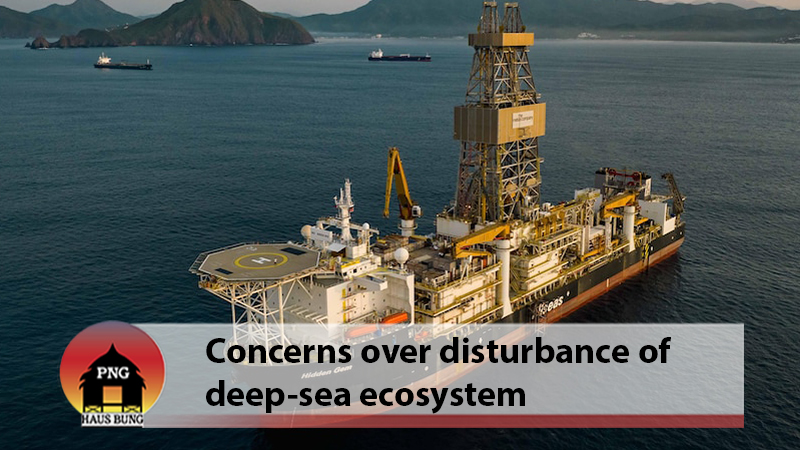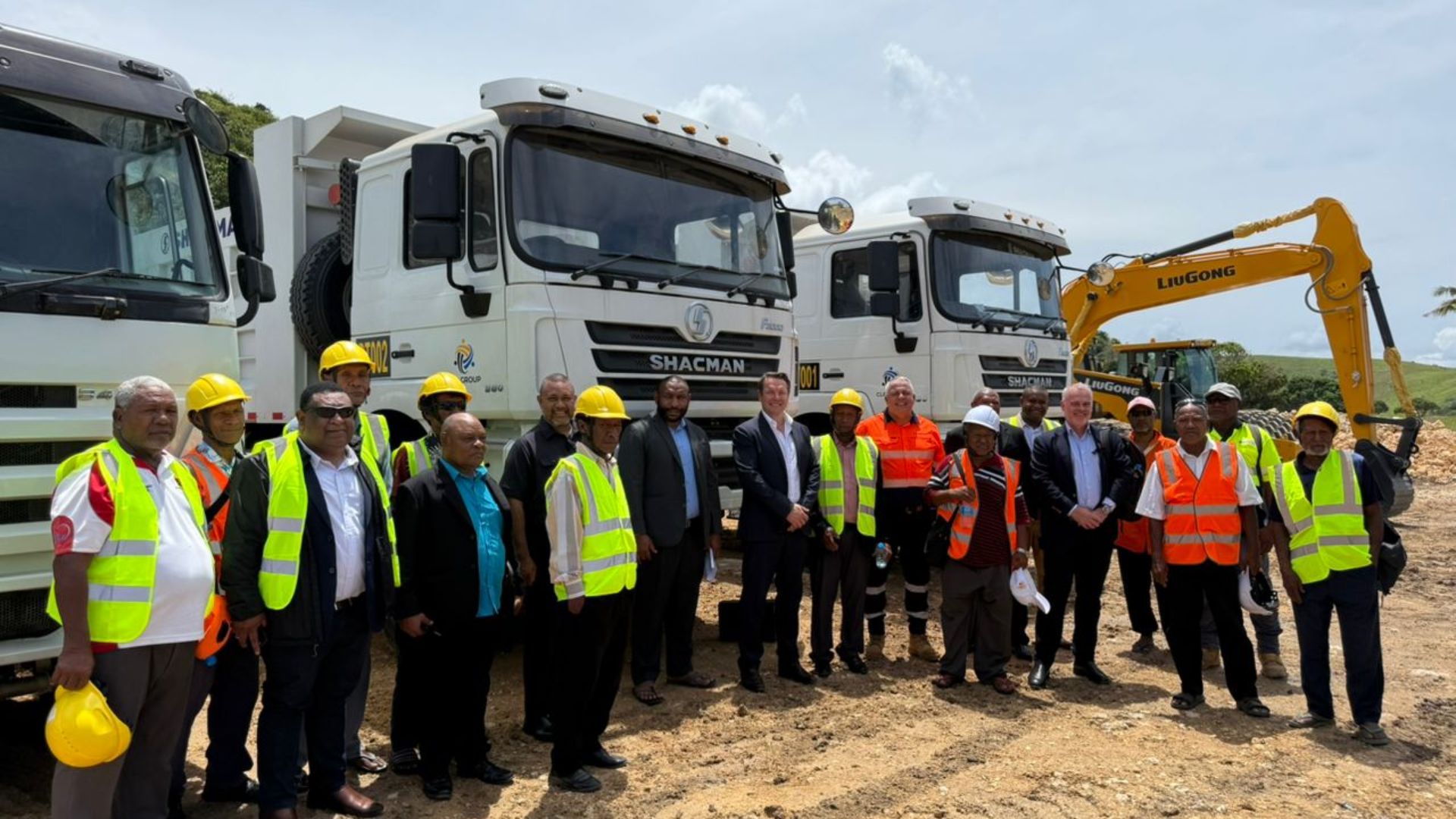Deep-sea mining operator The Metals Company has been granted approval by the International Seabed Authority to begin testing its collection system in Pacific waters.
It will be the first time since the 1970s that this has been allowed to occur.
Deep seabed mining companies want to collect deposits of minerals and precious metals that can be used in the production of products like smartphones and computers.
The Metals Company chief executive Gerard Barron told the ABC it was a very significant step towards deep-sea mining at a commercial scale.
"We'll be mobilising in the coming days," Mr Barron said.
One of the company's vessels is now preparing to leave Mexico, while another is already surveying the lucrative mining zone located between Mexico and Hawaii.
"It's a really exciting expedition," Mr Barron said.
[caption id="attachment_26655" align="alignnone" width="862"] The company hopes the trial will pave the way for deep-sea mining at a commercial scale. (Supplied: The Metals Company)[/caption]
The company hopes the trial will pave the way for deep-sea mining at a commercial scale. (Supplied: The Metals Company)[/caption]
The trial involves a robot that will crawl along the sea floor, collecting nuggets of rock that contain cobalt, nickel and other rare-earth metals used to make electric batteries.
These rocks will be sucked up to the water's surface through a device called a riser.
"Think of that as a big, long straw," Mr Barron said.
The company expects to collect around 3,600 tonnes of material between now and December.
Concerns over ecosystem disturbance
About 100 people, including scientists, will be on board another vessel, observing the environmental impact of the work.
Mr Barron urged people to not jump to conclusions about what those impacts may be.
"Our view is 'can we just do the science'," he said.
"The evidence that we're seeing … is indicating that we can collect these rocks … at a fraction of the environmental and societal impacts compared to land-based alternatives."
Mr Barron said rare metals collected from the seabed were essential in the transition to a carbon-neutral planet.
 The mining company's subsea collector will crawl along the seafloor, collecting nuggets of rock that contain rare-earth metals. (Supplied: The Metals Company)[/caption]
The mining company's subsea collector will crawl along the seafloor, collecting nuggets of rock that contain rare-earth metals. (Supplied: The Metals Company)[/caption]
But some scientists argue the true risks of deep-sea mining are not fully understood.
Gavin Mudd, an associate professor of environmental engineering at RMIT University, said the ecosystems where mining would occur had taken centuries, or even millennia, to form.
"We're dealing with a part of the ocean that has incredibly unique biodiversity. And we're only just starting to understand that," Dr Mudd said.
"I think there are real concerns around any disturbance of deep-sea ecosystem like this."
Dr Mudd said the environmental impacts should be monitored over decades.
"That's often not the way that regulators and companies approach things," he said.
"They do a trial for a short time, and then they extrapolate."
'We're not dealing with equatorial rainforests'
Mr Barron said environmental monitoring would take place over decades, but expressed urgency to push forward with extraction.
"We don't have the luxury of sitting back now and saying, 'well, we should be monitoring this for another 10 years'," he said.
"We've been studying this part of the ocean … since the late 1960s.
"So the notion that we don't know much about this is just plain wrong."
Mr Barron said 80 per cent of fauna living on the seabed was bacteria.
"That doesn't mean it's not important, and that we shouldn't do everything we can to understand it, and to protect it," he said.
"But it helps that we're not dealing with equatorial rainforests."
[caption id="attachment_26659" align="alignnone" width="862"] Nodules collected from the seabed can contain essential battery metals. (Supplied: The Metals Company)[/caption]
Nodules collected from the seabed can contain essential battery metals. (Supplied: The Metals Company)[/caption]
However, Pacific countries are divided in their opinions about deep-sea mining.
Tuvalu Minister of Foreign Affairs Simon Kofe said there should be consultation within the region before any exploration or extraction takes place.
"I note the numerous procedures that were followed toward the approval of the pilot trial, but I feel that the Pacific i
Pacific nations watching closely
The government of Nauru is sponsoring The Metals Company's activities in the Clarion Clipperton Zone – a part of the international seabed reserved for Pacific states.
s quite divided on the issue," Mr Kofe said.
"Nations have declared or proposed moratoriums, citing the unknown risks of mining to our ocean and its biodiversity."
Last year, Nauru also pushed the International Seabed Authority to fast-track the creation of deep-sea mining regulations.
"We understand why countries are moving in this direction, but the risks are immense, and it is a matter that can affect our entire Pacific family," Mr Kofe said.
"I believe further consultation should be undertaken among our Pacific nations before these trials begin."
Kiribati and Cook Islands have also been exploring the possibility of seabed mining in their own domestic waters.
The seabed minerals commissioner for the Cook Islands Seabed Authority, Alex Herman, said her organisation would be watching the trial closely.
[caption id="attachment_26660" align="alignnone" width="862"] Mr Kofe, who became widely known for giving a COP26 statement in water to highlight climate change threats, is concerned about the mining. (Reuters)[/caption]
Mr Kofe, who became widely known for giving a COP26 statement in water to highlight climate change threats, is concerned about the mining. (Reuters)[/caption]
"The Cook Islands is only allowing exploration at this stage," she said.
"We currently don't have enough information to support moving to the next phase, which would be harvesting nodules."
Ms Herman believes individual countries should be able to make autonomous decisions surrounding seabed mining.
"Some of these moratorium calls are confusing, ambiguous, arbitrary and cut across the sovereign rights of our country," she said.
Last year, Nauru also pushed the International Seabed Authority to fast-track the creation of deep-sea mining regulations.
"We understand why countries are moving in this direction, but the risks are immense, and it is a matter that can affect our entire Pacific family," Mr Kofe said.
"I believe further consultation should be undertaken among our Pacific nations before these trials begin."
Kiribati and Cook Islands have also been exploring the possibility of seabed mining in their own domestic waters.
The seabed minerals commissioner for the Cook Islands Seabed Authority, Alex Herman, said her organisation would be watching the trial closely.
"The Cook Islands is only allowing exploration at this stage," she said.
"We currently don't have enough information to support moving to the next phase, which would be harvesting nodules."
Ms Herman believes individual countries should be able to make autonomous decisions surrounding seabed mining.
"Some of these moratorium calls are confusing, ambiguous, arbitrary and cut across the sovereign rights of our country," she said.
Allegations of backdoor deals
Others have expressed concern around transparency within the industry.
Greenpeace Aotearoa seabed mining campaigner James Hita said they were concerned about discussions between mining companies and the regulator, the International Seabed Authority.
"They meet behind closed doors," he said.
"There is a huge issue with us not being able to scrutinise and not being able to hold to account these companies and the licenses they hold to mine."
A New York Times report alleged the International Seabed Authority provided The Metals Company with information, which helped it secure licences to lucrative mining zones.
Mr Barron denied the claim.
"We are absolutely certain that no information exchanged hands between the regulator and between The Metals Company around the permits," he told the ABC.
Mr Barron also raised eyebrows when he represented Nauru at an International Seabed Authority assembly in 2019.
He said it was "naive" to suggest his company was influencing the government.
"If you've ever met anyone from Nauru, you will know that no one pulls their strings as a nation," Mr Barron said.
"They are very proud. They're very forthright, and they're nobody's puppet."
Source: ABC Pacific




